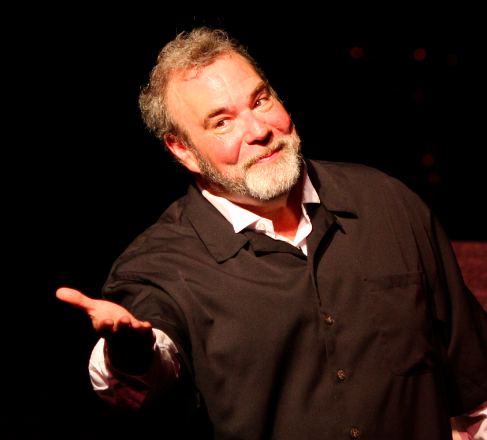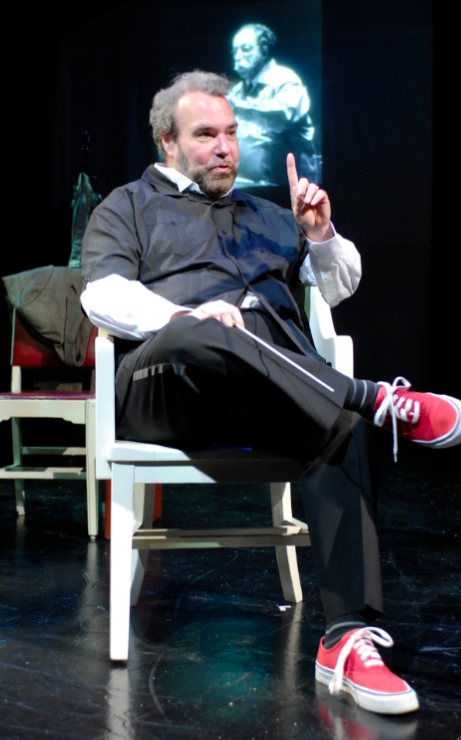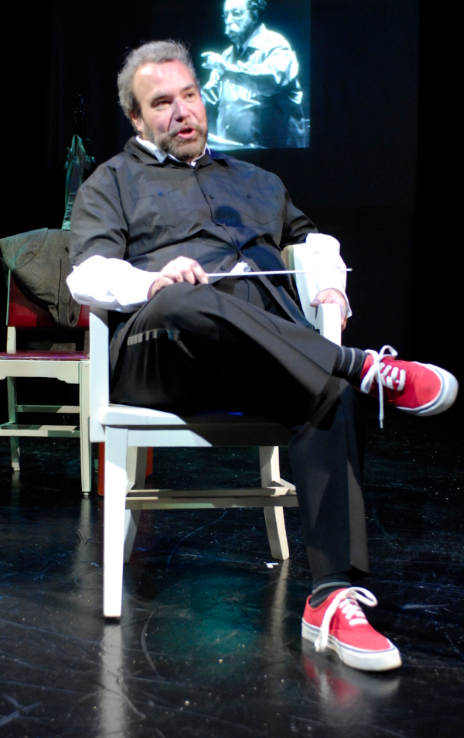 "...Katz's rapid shifts in character are instantaneous and nearly flawless..."—Citizen News
"...Katz's rapid shifts in character are instantaneous and nearly flawless..."—Citizen News
ACT I
 After the overture, the silence of anticipation: tonight, secrets are revealed. So much music—a lifetime of music. So many composers—which pieces hold the beauty we need to know?
After the overture, the silence of anticipation: tonight, secrets are revealed. So much music—a lifetime of music. So many composers—which pieces hold the beauty we need to know?
The Apprentice is alone in his studio, remembering his Sorcerer, the man who would become his Muse: How, at first, he hated him and didn’t want to be his student. How he was captured by him, and then freed. How he learned to love him—and what happened on the last day. The Apprentice conjures the ghost of his Muse, but the Sorcerer expresses little interest, except to berate his ambitions and scold him for attending the wrong school. How did the Apprentice change from horrified observer, to unwilling participant, to eager disciple?
Years ago, in Maine, while the orchestra played Wagner, the Apprentice watched in awe as the Sorcerer turned a lesson into a student’s funeral. Back in the present, the Sorcerer appears again, as if from the dead. He is angry. Some facts the Apprentice got wrong. Now, the Muse insists, he will watch everything that happens, and correct his student, just as he did years before.
The scene shifts to events in the past: Backstage at the opera, the Apprentice rejects an invitation. At dinner, the Apprentice fails a test. But the invitations continue. Finally, drawn to Maine by its beauty, the Apprentice is introduced to the moon that lies.
At the school, the Sorcerer makes a grand entrance. Hapless conducting students suffer his wrath. Soon the Apprentice himself is the victim on the podium, punished for his superficiality. The notes and rhythms are not enough. Music demands more. The cymbals crash. There must be a day of reckoning. When it comes, the Sorcerer proves so powerful that he takes control of everything, even wresting control of the play itself.
ACT II
 The Sorcerer provides the audience with a thirty second lesson in conducting. Then, again alone in his studio, he remembers a special performance from long ago. Soon, the Apprentice returns, and with the help of his Muse, reveals the musical experience that forever changed him. Epiphany. After a great composer arrives to help heal every loss, the Apprentice’s future is revealed.
The Sorcerer provides the audience with a thirty second lesson in conducting. Then, again alone in his studio, he remembers a special performance from long ago. Soon, the Apprentice returns, and with the help of his Muse, reveals the musical experience that forever changed him. Epiphany. After a great composer arrives to help heal every loss, the Apprentice’s future is revealed.
The scene shifts. Did the Sorcerer know his students imitated him? And what about the composers who were his friends (or his enemies)? Lessons. An encounter with music from the Holocaust is a harrowing experience for both men, one that illuminates the Sorcerer’s character and the Apprentice’s love.
Now old and sick, the Sorcerer can no longer leave his house; the orchestra goes to him. On his deathbed, a fantastic symphony of orchestral music overwhelms the scene. At the climax of the Fireworks Music, one conductor stands for all.
The Apprentice reflects on the awesome power of music. How does it transcend ages and oceans? But the Muse of Fire does not answer questions. The answers are to be found only in the music itself.
